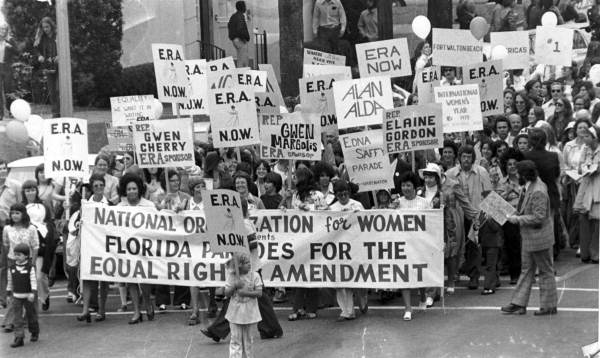Is it too late to pass the Equal Rights Amendment? Illinois is the 37th state to ratify it

A march in support of the Equal Rights Amendment in 1975 in Tallahassee, Florida. The state of Florida has not ratified the ERA. Wikimedia Commons
Illinois lawmakers approved the Equal Rights Amendment on Wednesday, despite a 1982 deadline for ratification.
Illinois was the 37th state to approve the amendment, one short of the number needed if there were no deadline, report the Chicago Tribune and the Chicago Sun-Times.
University of Chicago law professor Geoffrey Stone tells the Chicago Tribune it’s unclear whether the amendment could still be added to the Constitution. He says there are already many federal laws giving women equal rights, but the amendment would lock in those protections and “would make some difference in marginal cases where the law allows discrimination today.”
Some supporters say the deadline is a dead issue in light of the 1992 ratification of the so-called Madison Amendment preventing midterm changes in congressional pay—an amendment first proposed in 1789 and submitted to the states for ratification.
There was no deadline for ratification of the Madison Amendment, but Congress’ promulgation of the amendment in 1992 showed it believed it had the authority to determine whether the time lapse meant the amendment was no longer valid, according to an article in the William & Mary Journal of Women and the Law.
Likewise, Congress could determine that the Equal Rights Amendment is still viable, the article argues.
Another view in favor of ERA viability is that time limits in a proposing clause of an amendment are irrelevant because states ratify the amendment, and not the proposing clause, the article says.
Lawyer Alice Paul drafted the Equal Rights Amendment, according to the website EqualRightsAmendment.org. Her final version reads: “Equality of rights under the law shall not be denied or abridged by the United States or by any state on account of sex.” There are also clauses that say Congress can enforce the amendment by appropriate legislation, and it takes effect two years after ratification.
When Congress sent the proposed amendment to the states for ratification in 1972, it originally set a seven year deadline. Congress later extended the deadline to 1982.
The extension is itself evidence of Congress’ power to accept ratification of the ERA if a 38th state acts, according to the authors of the law review article.



